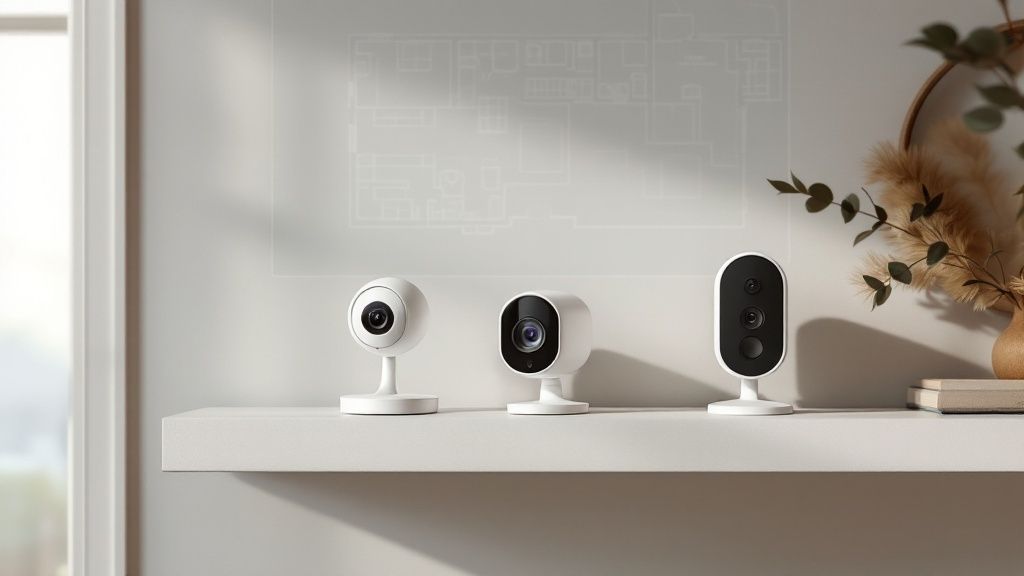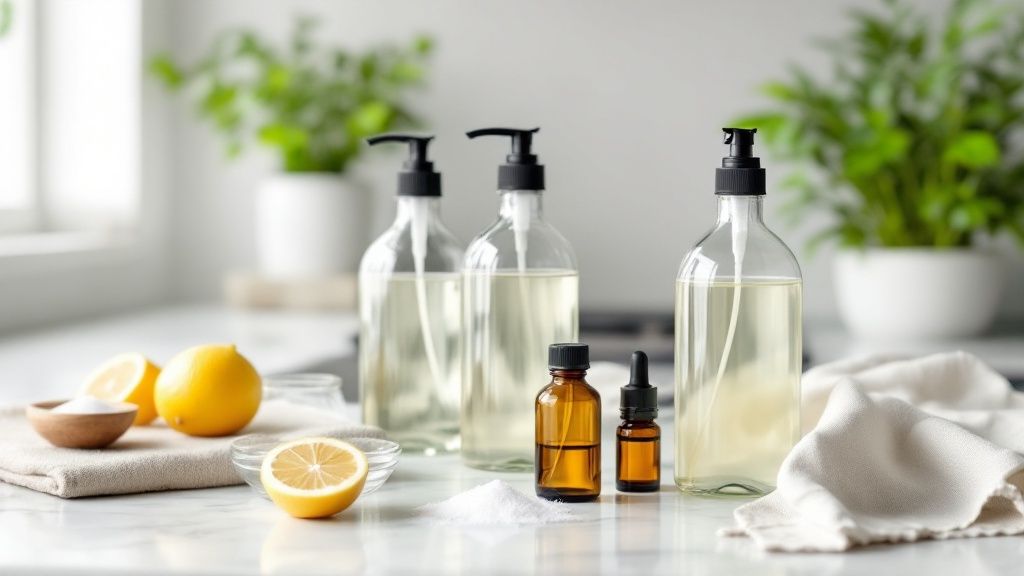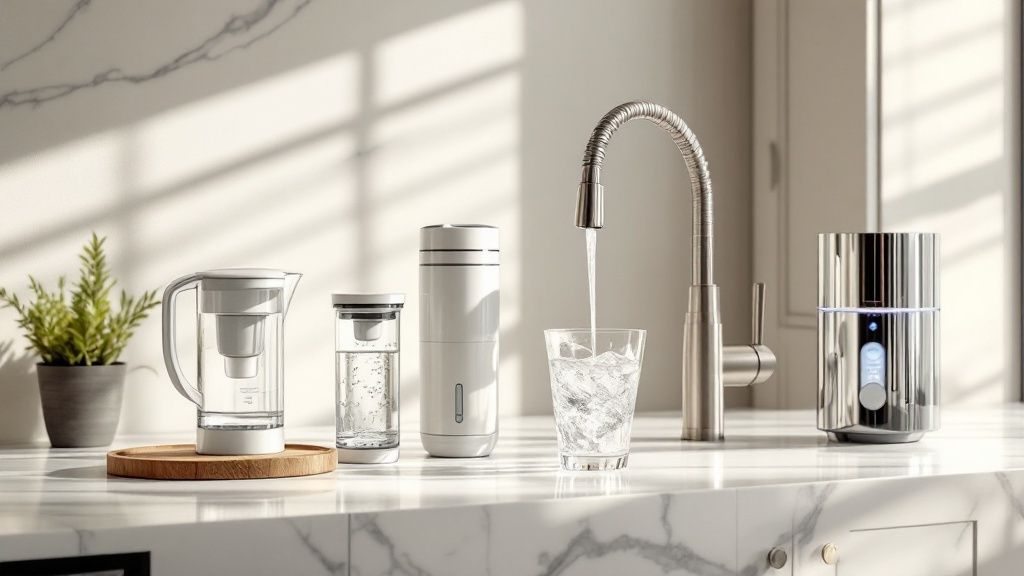
A Friendly Guide to the Best Water Filter for Home Use
Hello there! Finding the best water filter for home use can seem tricky, but we're here to make it wonderfully simple. Whether you want the purest, best-tasting water from an under-sink system or just an easy-to-use pitcher, this guide will help you discover the perfect match for your home and family.
Why Finding the Right Water Filter Matters
Welcome! We get it—the world of water filters can feel a little overwhelming at first, but our goal is to help you navigate it with confidence. Choosing a filter is about more than just making your water taste better; it's a huge step toward protecting the health and well-being of your family. Every glass of water you pour should be clean, safe, and refreshing.
The quality of your tap water can change drastically from one town to the next. Even though city water systems do their best to meet safety standards, things like chlorine, lead, sediment, and trace chemicals can still make their way through the pipes to your faucet. A quality filter is that last, critical line of defense.
Understanding the Growing Need for Clean Water
More people are taking control of their water quality now than ever before. The global market for water filters is proof, with experts projecting it will grow from USD 15.88 billion to USD 26.42 billion by 2032. This isn't just a trend; it's a shift driven by a greater awareness of water quality issues and amazing new filtration technologies.
Here at Wonders Emporium Shop, our mission is to give you the knowledge you need to make a choice you feel great about. As a company proudly Owned & Operated by Boricua Innovations LLC, we stand behind our commitment to quality products, Puerto Rican pride, and fantastic customer care.
Key Benefits of a Home Water Filter
Putting the right system in place brings some immediate perks to your daily life. Here are just a few of the biggest advantages:
- Improved Health and Safety: A good filter helps reduce your exposure to potentially harmful contaminants that may be lurking in tap water.
- Better Taste and Odor: By stripping out chlorine and other impurities, filters give you water that’s much more enjoyable to drink and cook with.
- Cost-Effective Solution: Filtering your own water is way cheaper over time than constantly buying bottled water, not to mention it's much kinder to the planet.
- Peace of Mind: There's real comfort in knowing that the water your family is drinking is pure and clean.
It’s completely normal to start this process by asking, "What is the Best Water Filter for My house?" to help narrow things down. This guide is here to answer that very question and a whole lot more. For other tips on creating a healthier home, be sure to check out our guide on unique cleaning solutions.
Comparing the Four Main Types of Water Filters
Deciding on the best water filter for home use isn't a one-size-fits-all situation. It really starts with understanding your options. Let’s break down the four main categories to see which one genuinely fits your space, needs, and lifestyle, so you can make a choice you feel good about.
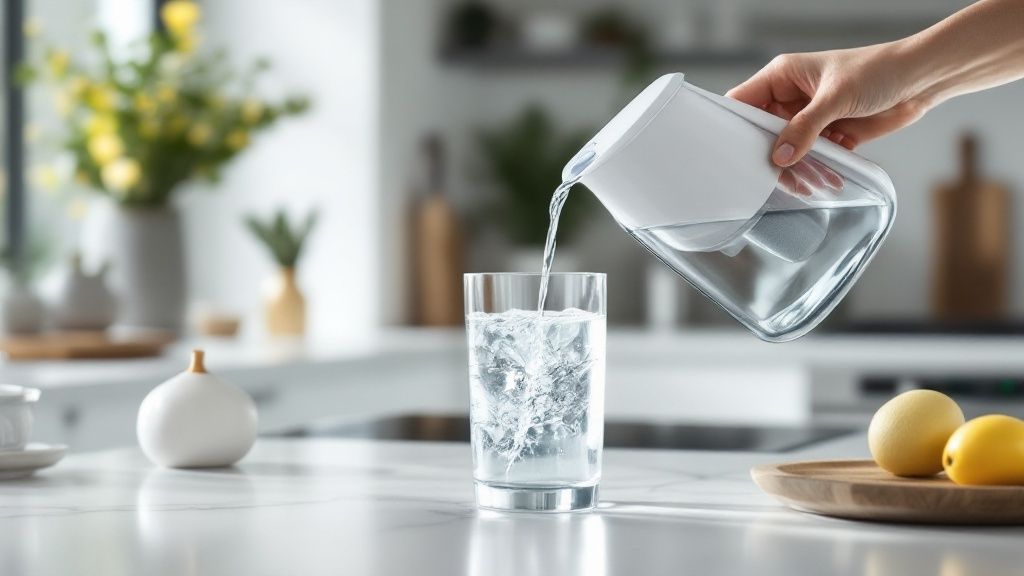
Alt-text: A modern kitchen sink with a water filter pitcher sitting next to it, illustrating a simple home water filtration option.
Pitcher Filters: The Simple Starter
Water filter pitchers are the most straightforward entry into cleaner water. It's as simple as it gets: fill the top reservoir, and let gravity pull the water through an activated carbon filter into the pitcher below.
There's zero installation involved, which makes them a go-to for renters or college students. They're also incredibly friendly on the wallet upfront.
But that convenience has its trade-offs. Pitchers have a pretty small capacity and filter water slowly. This can be a drawback for larger families or anyone who uses a lot of filtered water for cooking.
Faucet-Mounted Filters: On-Demand Convenience
A faucet-mounted filter is a nice step up, attaching directly to your kitchen tap for filtered water with the flip of a switch. No more waiting around for a pitcher to fill—the convenience is a huge plus.
Installation is usually a breeze and often tool-free, taking just a few minutes. Most of these use activated carbon to cut down on chlorine, lead, and other common contaminants, which makes a noticeable difference in the taste and smell of your tap water.
While they're super convenient, they can slow down your water flow. They also might not fit on all faucet styles, especially the pull-out or custom-designed ones. It’s a fantastic middle ground for anyone wanting more than a pitcher without committing to a permanent installation.
Countertop Filters: Power Meets Simplicity
Countertop filters give you more robust filtration than pitchers or faucet mounts, and you still don't have to mess with any plumbing. These systems just sit next to your sink and connect to the faucet with a small hose.
They can hold larger, more advanced filters, like multi-stage carbon blocks or even specialized ones that target specific contaminants. This makes them a great option if you want a higher level of purification but can't install an under-sink system.
Key Insight: Countertop systems provide a powerful filtration solution that remains portable, making them ideal for renters who prioritize performance but need a non-permanent setup. They bridge the gap between simple faucet mounts and more complex under-sink units.
The main downside? They take up valuable counter space. In a smaller kitchen, that can be a major dealbreaker.
Under-Sink Systems: The Comprehensive Solution
For those looking for the most thorough, seamless filtration possible, an under-sink system is the gold standard. These units are installed directly into your water line right under the sink, feeding purified water through a dedicated faucet.
Many of these models use advanced tech like reverse osmosis (RO), which can remove up to 99% of dissolved solids—we're talking nitrates, arsenic, and fluoride. They may provide the highest level of purification you can get for your home.
The demand for these powerful systems is growing fast. The global water purifier market was valued at about USD 104.94 billion and is projected to hit nearly USD 179.85 billion by 2032. It shows people are paying more attention to water quality and how effective modern filtration can be. You can discover more about the water purifier market trends here.
While they offer top-tier performance, under-sink systems are the most expensive option and might require a professional to install them. For homeowners who put a high priority on long-term health and convenience, though, the investment is often well worth it.
A Detailed Breakdown of Filter Performance
Alright, let's get to the heart of the matter—how do these filters actually stack up in the real world? Finding the best water filter for home use means looking past the marketing and digging into the practical details that affect your home, budget, and daily life.
This quick visual breaks down some of the most common filter technologies you'll find on the market.
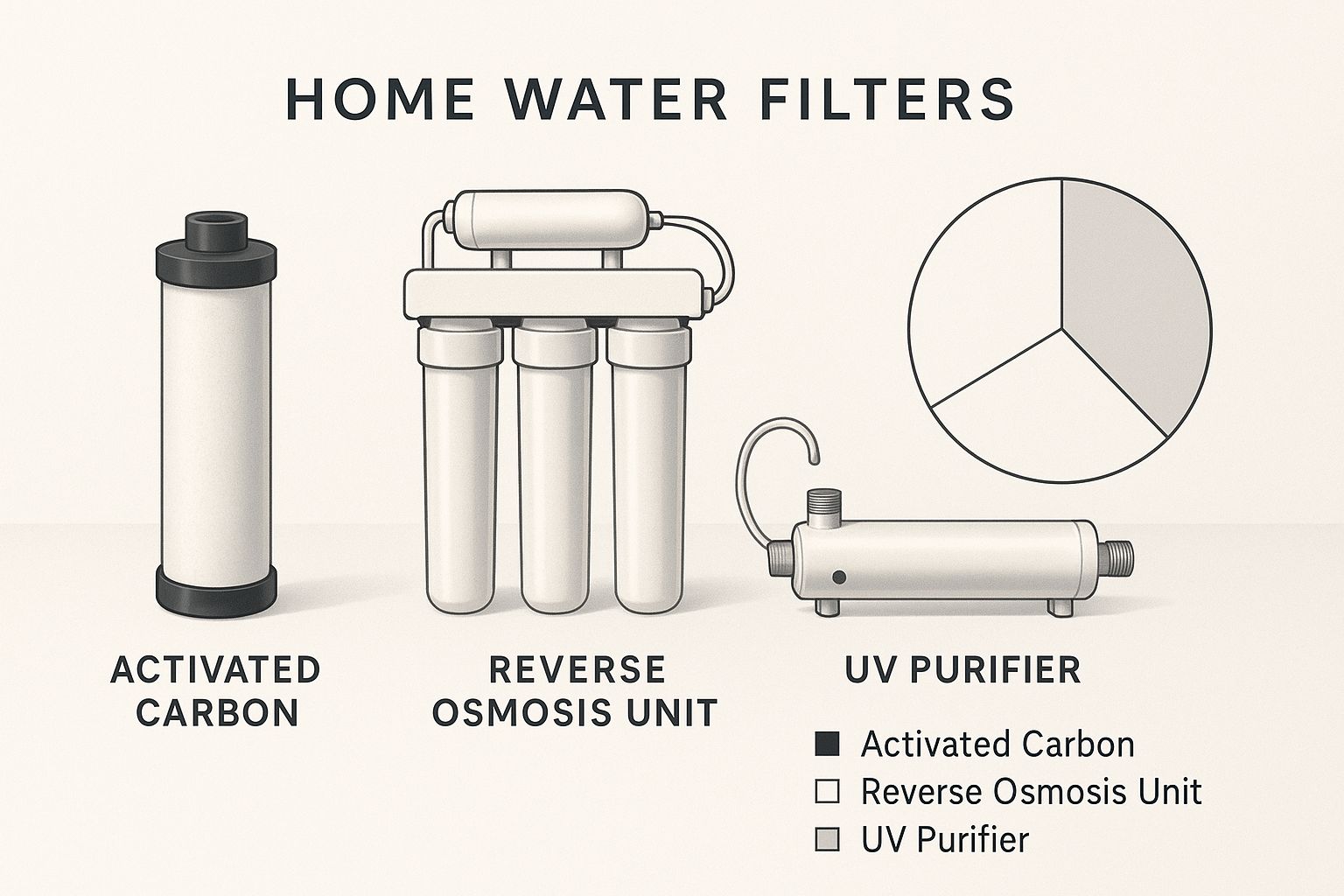
Alt-text: Infographic showing icons for different water filter technologies like activated carbon, reverse osmosis, and UV purification, helping users understand their options.
It’s a great starting point for understanding how different methods like activated carbon and reverse osmosis work, which are often combined in more advanced systems to get the job done.
Contaminant Removal Effectiveness
When it comes to purification, not all filters are created equal. Performance comes down to the technology inside, which directly determines what it can and can't pull out of your water.
A basic pitcher or faucet filter typically uses activated carbon. This stuff is great for making water taste and smell better by grabbing onto chlorine and certain organic compounds. But it may not do much against contaminants like heavy metals, fluoride, or bacteria.
Jump up to an under-sink reverse osmosis (RO) system, and you're in a different league. RO uses a special membrane that forces water through at a microscopic level, filtering out up to 99% of dissolved solids. We're talking about lead, arsenic, nitrates, and fluoride—things that simple carbon filters just can't touch.
Key Takeaway: If your main goal is to remove a wide range of serious health-related contaminants, an RO system is the clear choice. If you just want to improve the taste of your city's tap water, a simple and affordable activated carbon filter is a perfectly good option.
Initial Cost Vs Long-Term Maintenance
That price on the box is just the beginning. The real cost of any water filter is the upfront purchase plus what you’ll spend on replacement cartridges over its lifetime. Here’s a simple step-by-step breakdown:
- Calculate the Upfront Cost: Note the initial price of the unit itself.
- Find the Replacement Filter Cost: Check the price for a new cartridge.
- Determine Replacement Frequency: See how many months or gallons the filter lasts.
- Estimate Annual Cost: Divide the replacement filter cost by its lifespan in months, then multiply by 12. Add this to your initial cost for the first year.
- Pitcher Filters: Super cheap to start, often just $20–$50. But those small filters need replacing every couple of months, which can easily run you $60–$100 a year.
- Faucet-Mounted Filters: Also easy on the wallet upfront at $30–$60. The filters last a bit longer, maybe three months, putting the annual cost in a similar ballpark of $50–$90.
- Under-Sink Systems: This is where you'll see the biggest initial investment, anywhere from $150 to over $500. The upside? Their high-capacity filters only need changing every six to twelve months (or longer for some parts), making the yearly maintenance cost surprisingly low at around $70–$150.
When you look at it long-term, the real value starts to show. An under-sink unit might feel like a big purchase, but its cost per gallon of filtered water is often much, much lower.
Water Flow Rate and Daily Convenience
How a filter fits into your daily routine is just as important as how well it cleans your water. Convenience is a huge factor, and this is where the different types really show their true colors.
Pitcher filters are the least convenient if you use a lot of water. You have to fill the reservoir by hand and then wait for the water to slowly drip through. This becomes a real pain when you're trying to cook or fill up a few water bottles at once.
Faucet-mounted and under-sink systems give you filtered water instantly, right from the tap. No waiting. The trade-off is that faucet mounts can slow down your sink's overall flow rate a bit, while the dedicated faucet from an under-sink RO system will deliver a steady—but not gushing—stream of pure water.
Installation and Space Requirements
Your living situation can definitely limit your options. If you're renting, you probably can't go drilling holes and making permanent changes to the plumbing.
- Pitchers and Countertop Filters: Perfect for apartments because they require zero installation. Just take them out of the box, and you're good to go.
- Faucet-Mounted Filters: Also renter-friendly; they screw onto most standard faucets in a few minutes with no tools needed.
- Under-Sink Systems: The most involved. They need dedicated space in your cabinet and have to be connected directly to your water lines. While many are designed for a confident DIYer, some people prefer hiring a plumber, especially if it means drilling a hole in the countertop for the separate faucet.
Average Filter Lifespan
A filter's lifespan is all about how often you have to think about maintenance. It’s usually measured in gallons or months, whichever comes first.
- Pitcher Filters: Have the shortest life, around 40 gallons or 2 months.
- Faucet Filters: A step up, lasting for about 100 gallons or 3 months.
- Countertop Filters: Varies a lot, but many can handle 500 gallons or more.
- Under-Sink Filters: These are the marathon runners, often lasting 600-1,200 gallons or 6-12 months for the main filters. The RO membrane itself can go for 2-4 years.
To help you see how these options stack up side-by-side, we've put together a simple comparison matrix.
Water Filter Performance Comparison Matrix
This table gives you a quick, at-a-glance look at how the different filter types perform across the most important factors.
| Feature | Pitcher Filters | Faucet-Mounted Filters | Countertop Systems | Under-Sink Systems |
|---|---|---|---|---|
| Contaminant Removal | Basic (Chlorine, Odor) | Basic (Chlorine, some Lead) | Moderate to High | Highest (RO, Heavy Metals) |
| Initial Cost | Very Low ($20-$50) | Low ($30-$60) | Moderate ($70-$200) | High ($150-$500+) |
| Long-Term Cost | High (Frequent Replacements) | High (Frequent Replacements) | Moderate (Less Frequent) | Low (Infrequent Replacements) |
| Flow Rate | Very Slow (Gravity-fed) | Instant (Slightly Reduced) | Instant | Instant (Dedicated Faucet) |
| Installation | None | Very Easy (DIY) | None to Easy | Moderate to Difficult (Plumbing) |
| Filter Lifespan | Short (40 gal / 2 mos) | Short (100 gal / 3 mos) | Medium (500+ gal / 6 mos) | Long (600-1200+ gal / 1-2 yrs) |
| Best For | Single Users, Renters | Renters, Small Households | Families, Renters wanting more | Homeowners, Max Purification |
Use this as a guide to narrow down which filter type best aligns with your water quality goals, your budget, and how you live.
At Wonders Emporium Shop, our goal is to give you clear, honest advice so you can make the best long-term choice for your home and family.
Finding the Right Filter for Your Lifestyle
Let's be honest, the "best" water filter isn't just about what the box says. It’s about finding the one that actually fits into your life without a fuss. We're going to move past the technical jargon and look at how different filters work in real homes, so you can picture the right choice for you.
The Busy Renter in a Small Apartment
Picture this: you're in a cozy city apartment where space is gold and you can't go making changes to the plumbing. You just want your tap water to taste better—that strong chlorine flavor has got to go—but you need a solution that’s simple.
Convenience is everything here. A top-notch pitcher filter or a simple faucet-mounted filter is going to be your best friend. Neither requires permanent installation, and they start working the minute you take them out of the box.
- Pitcher Filter: Absolutely perfect for one or two people. You can pop it in the fridge and always have chilled, clean-tasting water ready to go. It’s the definition of a low-commitment, high-reward upgrade.
- Faucet-Mounted Filter: This little gadget gives you instant filtered water right from the tap. It’s a game-changer for cooking pasta or quickly filling your water bottle before you dash out the door.
The Health-Focused Family with Children
Now, let's switch gears to a family in a suburban home. Your number one priority is making sure your kids are safe and healthy, so you need a filter that’s a powerhouse against contaminants. You’re looking for total peace of mind, knowing that everything from lead and pesticides to invisible chemicals is being reliably removed.
For this job, you need a more serious, permanent solution. An under-sink reverse osmosis (RO) system is really the gold standard for water purification.
An under-sink system works silently out of sight to deliver the purest water possible. Think of it as an investment in your family’s long-term health, ensuring every glass from its dedicated tap is exceptionally clean.
This system stays hidden away and delivers a constant supply of purified water, which is exactly what a busy household needs. It may tackle a much wider range of contaminants than simpler filters, making it the clear winner for any health-conscious family. And if you're building a healthier home, our guide to sustainable home products has other great ideas you might love.
The Home Chef Needing High-Volume Purified Water
Finally, imagine you're a passionate home cook. You live in your kitchen, and you know that the quality of your water changes everything—from how clear your soup broth is to how well your sourdough rises. You need a lot of pure water, and you can't be waiting around for a pitcher to slowly filter.
A countertop filter or a high-capacity under-sink system is the ideal sous chef. Countertop units hook right up to your faucet for powerful, multi-stage filtration without any plumbing work. They provide filtered water on demand, easily keeping up with your culinary creativity.
An under-sink system works just as well, giving you an endless stream of pure water from its own faucet. It makes filling big stockpots or washing vegetables completely seamless.
At Wonders Emporium Shop, proudly Owned & Operated by Boricua Innovations LLC, our goal is to connect you with products that make a real difference in your life. More and more people are turning to home filtration because of a growing awareness of water quality issues. The global market for water treatment systems was valued at USD 41.75 billion and is projected to more than double by 2034, showing a massive worldwide shift toward taking water safety into our own hands.
Of course, your active life doesn't stop at the kitchen sink. To keep your pure water perfectly chilled all day, check out some tips on choosing the best insulated water bottles to match your commitment to great hydration.
Essential Features and Certifications to Check
Once you've got a general idea of the filter type that suits your lifestyle, it's time to zoom in on the details. This is where you separate a good filter from a great one. Think of it as your final quality checklist before you buy, ensuring the product you pick is effective, convenient, and trustworthy for the long haul.
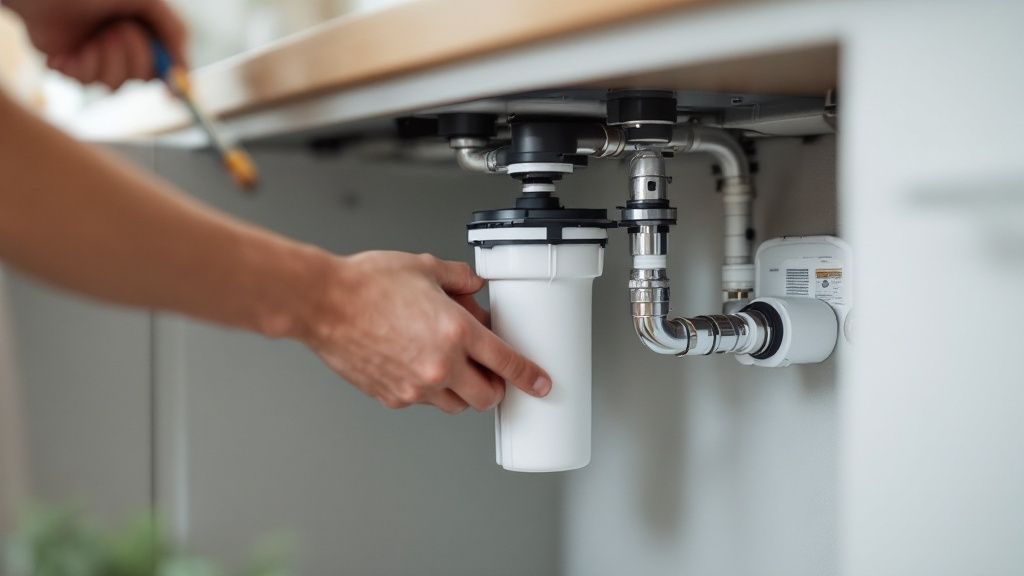
Alt-text: A close-up shot of an NSF certification logo on a water filter package, emphasizing the importance of third-party verification.
Decoding NSF and ANSI Certifications
When you're comparing filters, you’ll probably see labels like "NSF/ANSI Certified." These aren't just marketing fluff; they are your guarantee of quality and performance. The National Sanitation Foundation (NSF) is an independent organization that tests products to make sure they meet strict public health standards.
These certifications are basically a trusted, third-party verification that a filter does exactly what the box says it does. A company can claim its filter removes chlorine, but an NSF certification proves it.
Here are the two most important standards you’ll want to look for:
-
NSF/ANSI 42: This certification is all about aesthetics—taste, smell, and appearance. If you want to get rid of that chlorine taste from your tap water, this is the standard that confirms a filter can do it.
-
NSF/ANSI 53: This one is crucial for health concerns. A filter certified to this standard is proven to reduce specific health-related contaminants like lead, mercury, asbestos, and certain pesticides.
Looking for these certifications is the simplest way to find the best water filter for home use. It cuts through the marketing noise and gives you verified proof of performance.
Beyond Certifications: Key Features to Look For
While certifications are crucial, a few other practical features can make a huge difference in your day-to-day experience. These are the little things that determine whether your new filter becomes a seamless part of your routine or a constant headache.
Filter Life Indicators
A filter is only good if it's changed on time. A filter life indicator—whether it’s a simple sticker, a flashing light, or a digital gauge—is an incredibly helpful feature. It’s a simple reminder that ensures your water stays consistently clean.
BPA-Free Construction
If you're buying a filter to improve your health, you want to make sure the filter itself isn't adding anything unwanted back into the water. Look for products that are explicitly labeled BPA-free. This means the plastic parts are made without bisphenol A, a chemical many people prefer to avoid.
Ease of Filter Replacement
How easy is it to swap out an old cartridge? Some systems have a simple twist-and-lock design that takes seconds, while others might require tools and a bit of muscle. Reading reviews or watching a quick video online can give you a great sense of what you're getting into.
A filter that is difficult to change is a filter that won't get changed on time. Prioritizing a user-friendly replacement mechanism is a small choice that has a big impact on long-term performance and convenience.
Product Warranties
Finally, a solid warranty shows that a company stands behind its product. Look for a warranty that covers the filter housing and its parts for at least one year. This gives you peace of mind and supports your investment if anything goes wrong.
At Wonders Emporium Shop, we believe in giving our customers clear, honest information. By checking for these key certifications and features, you can shop with confidence, knowing you're choosing a high-quality filter that will serve your family well.
Making Your Final Decision with Confidence
You've explored the options, weighed the features, and now it's time to choose the best water filter for home use. Making this final decision comes down to matching your top priority with the right technology. The goal is to find a solution that feels like a natural part of your daily routine.
Let's break it down one last time to make your choice crystal clear.
Your Path to Pure Water
If your main goal is total purification to support your family's health, an under-sink reverse osmosis (RO) system is likely your best bet. These systems are unmatched in their ability to remove a huge range of contaminants, from lead to arsenic, giving you ultimate peace of mind.
On the other hand, if you're looking for an affordable, simple way to improve the taste and smell of your city tap water, a certified pitcher filter is a fantastic place to start. It's an easy first step that makes a noticeable difference right away.
Final Questions Before You Buy
Before you add a filter to your cart, ask yourself these three key questions:
- What is my main goal? Is it just better taste, or am I concerned about specific health-related contaminants?
- What is my budget for the filter and its long-term maintenance? Don't forget to factor in the cost of replacement filters down the road.
- What will realistically fit my home and lifestyle? Think about installation, space under the sink, and how much water your family uses daily.
Answering these questions honestly helps you cut through the marketing noise and choose a filter that truly serves your family's needs. This thoughtful approach ensures you'll be happy with your investment for years to come.
At Wonders Emporium Shop, we are dedicated to providing products that reflect our commitment to quality, uniqueness, and exceptional customer care. Improving your water quality often goes hand-in-hand with creating a more mindful home. For more inspiration, explore our guide on zero-waste lifestyle tips.
Your Top Questions About Home Water Filters
Let's tackle some of the most common questions people have when picking out a home water filter. Getting these answers right is the key to choosing a system that works for your home and keeps delivering clean, great-tasting water.
How Often Do I Really Need to Change the Filter?
This is probably the number one question, and for good reason. Forgetting to change your filter means you're not getting the protection you paid for. The timing all comes down to the type of system you have and how much water your family uses.
- Pitcher Filters: 40–100 gallons (roughly 2–3 months)
- Faucet-Mounted Filters: 100–200 gallons (3–6 months)
- Countertop Systems: 300–600 gallons (4–8 months)
- Under-Sink RO Filters: 600–1,200 gallons (6–12 months)
Sticking to a schedule is crucial. An old, clogged filter can’t do its job and might even release the contaminants it has trapped back into your water.
Will My Filter Remove Healthy Minerals?
It's a valid concern—you want to remove the bad stuff, not the good. The answer depends entirely on the filtration technology.
Most standard activated carbon filters, like the ones in pitchers and faucet mounts, are great at leaving essential minerals like calcium and magnesium alone. They target chlorine and chemicals, so your water tastes better but still has those beneficial minerals.
Reverse osmosis is a different story. These systems are so thorough they remove almost everything, including minerals. While that's fantastic for purity, it can leave the water tasting a bit flat. That’s why many high-quality RO systems now include a remineralization stage to add healthy minerals back in after purification.
Key Insight: If you enjoy the taste of mineral water, either stick with a carbon-based filter or specifically look for a reverse osmosis system that has an alkaline or remineralization filter.
What’s the Difference Between a “Filter” and a “Purifier”?
These terms get thrown around a lot, but they aren't interchangeable. A filter is designed to remove larger particles, sediment, and chemicals like chlorine. Its main job is to improve the taste, smell, and clarity of your water.
A purifier, on the other hand, meets much higher standards. It must be able to remove or neutralize microbiological threats like bacteria and viruses. You'll often see systems that pair reverse osmosis with UV light labeled as purifiers because they provide a two-pronged defense against both chemical and biological contaminants.
“A purifier is designed to give you peace of mind against invisible pathogens as well as harsh chemicals,” notes a water safety expert.
Can I Really Install an Under-Sink Filter Myself?
Yes, you probably can! Many of today's under-sink systems are designed with DIY in mind. They usually ship with clear instructions and color-coded tubing that makes connecting everything pretty straightforward, especially if you have some basic plumbing know-how.
But let's be realistic—not everyone is comfortable working under their sink. If you're short on time or just don't want the hassle, calling a professional plumber is a smart move. It ensures a leak-free installation, and they can handle trickier tasks like drilling a new hole in your countertop for a dedicated faucet.
Ready to find the perfect filtration solution for your family? Explore our curated collection of unique and high-quality home goods at Wonders Emporium Shop today! For more helpful guides and to join our community, sign up for our mailing list. We can't wait to welcome you.

